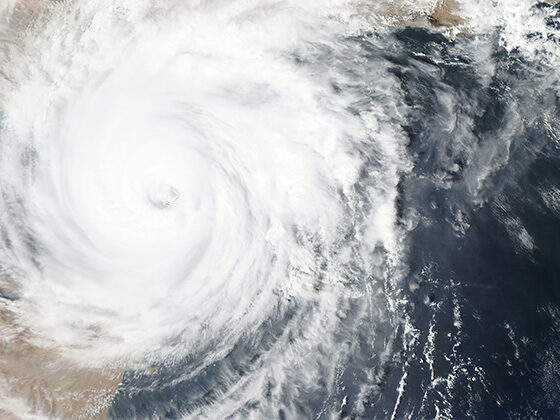News Details
Study: Climate change’s cost includes losses of learning and earnings due to natural disasters

Authored by: Juliana Rosati
Photography by: NASA on Unsplash
Faculty & Research
06/01/23
Philadelphia, PA — In the wake of natural disasters, survivors’ losses of education and lifetime earnings may be comparable to the cost of property damage, according to a new study in Nature Human Behaviour by Dr. R. Jisung Park, an assistant professor at Penn’s School of Social Policy & Practice (SP2) with a secondary appointment at the Wharton School, and coauthors Isaac M. Opper of RAND Corporation and Lucas Husted of Columbia University.
“In this paper, we compile what is to our knowledge the most comprehensive dataset assembled to date to assess the human capital consequences of natural disasters,” write Dr. Park and colleagues, who note the link between climate change and natural disasters.
By combining data about national disaster declarations, local property damage, standardized achievement, and post-secondary enrollment in the United States from 2008 to 2018, the authors quantify how natural disasters reduce learning, years of schooling, and ultimately the lifetime earnings of the people they affect:
- Natural disasters that cause assessed property damage of $10 to $100 per person result in reduced learning gains of approximately 0.006 standard deviations.
- Natural disasters that cause over $500 in per capita damages reduce postsecondary enrollment by approximately 2.5%.
- Disasters that caused at least $500 in per-capita physical damages reduced a region’s human capital by approximately $268 per capita ($1,500 per student).
- Disasters with per capita physical damages of $100 to $500 result in human capital losses of approximately $185 per capita ($1,050 per student).
“These numbers should be viewed as indicative of the impact that disasters have on human capital, rather than definitive estimates of their effects,” the authors write.
The findings bolster existing evidence that the natural environment is a significant factor contributing to economic inequality. They also point to the need to develop policy approaches that would help societies to address the human cost of natural disasters, such as educational assistance programs.
Park is an environmental and labor economist interested broadly in how environmental factors shape economic opportunity. Prior to joining Penn, he was a member of the faculty at UCLA, and a post-doctoral fellow at Harvard. Park’s research combines data, quasi-experimental methods, and economic analysis to better understand the implications of environmental change for human flourishing, and how effective policy responses may be designed.
About Penn’s School of Social Policy & Practice (SP2)
For more than 110 years, the University of Pennsylvania School of Social Policy & Practice (SP2) has been a powerful force for good in the world, working towards social justice and social change through research and practice. SP2 contributes to the advancement of more effective, efficient, and humane human services through education, research, and civic engagement. The School offers five top-ranked, highly respected degree programs along with a range of certificate programs and dual degrees. SP2’s transdisciplinary research centers and initiatives — many collaborations with Penn’s other professional schools — yield innovative ideas and better ways to shape policy and service delivery. The passionate pursuit of social innovation, impact, and justice is at the heart of the School’s knowledge-building activities.
